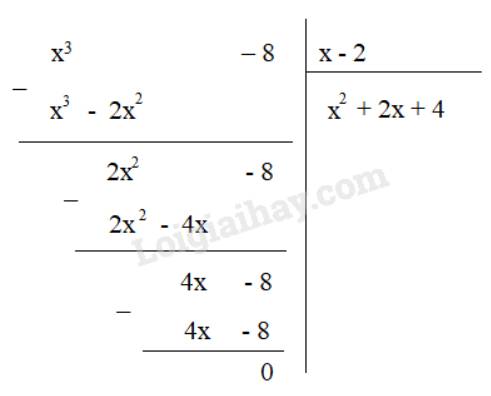1.thực hiện phép tính sau:
a, 3(x+1)-3x
b,x3 -x(x2-2)
Hãy nhập câu hỏi của bạn vào đây, nếu là tài khoản VIP, bạn sẽ được ưu tiên trả lời.


a)

b) (x – 1)(x + 1)(x2 + 1)
= [x .(x + 1) – 1 .(x + 1)] . (x2 + 1)
= {x.x + x.1 + (-1).x + (-1).1}. (x2 + 1)
= (x2 + x – x – 1) . (x2 + 1)
= (x2 – 1) . (x2 + 1)
= x2 . (x2 +1) – 1.(x2 + 1)
= x2 . x2 + x2 . 1 – (1.x2 + 1.1)
= x4 + x2 – (x2 + 1)
= x4 + x2 – x2 – 1
= x4 – 1

\(a,\left(x^3+5x^2-2x+1\right)\left(x-7\right)\\ =x^4-7x^3+5x^3-35x^2-2x^2+14x+x-7\\ =x^4-2x^3-37x^2+15x-7\\ b,\left(2x^2-3xy+y^2\right)\left(x+y\right)\\ =2x^3+2x^2y-3x^2y-3xy^2+xy^2+y^3\\ =2x^3-x^2y-2xy^2+y^3\\ c,\left(x-2\right)\left(x^2-5x+1\right)-x\left(x^2+11\right)\\ =x^3-5x^2+x-2x^2+10x--x^3-11x\\ =x^3-7x^2\\ d,x\left(1-3x\right)\left(4-3x\right)-\left(x-4\right)\left(3x+5\right)\\ =x\left(4-15x+9x^2\right)-\left(3x^2-7x-20\right)\\ =4x-15x^2+9x^3-3x^2+7x+20\\ =9x^3-18x^2+11x+20\)

a) \(x^2+2x=\left(x-2\right).3x\)
\(\Leftrightarrow x^2+2x=3x^2-6x\)
\(\Leftrightarrow x^2+2x-3x^2+6x=0\)
\(\Leftrightarrow-2x^2+8x=0\)
\(\Leftrightarrow-2x\left(x-4\right)=0\)
\(\Leftrightarrow\left[{}\begin{matrix}-2x=0\\x-4=0\end{matrix}\right.\)
\(\Leftrightarrow\left[{}\begin{matrix}x=0\\x=4\end{matrix}\right.\)
Vậy S = {0;4}
b) \(x^3+x^2-x-1=0\)
\(\Leftrightarrow x^2\left(x+1\right)-\left(x+1\right)=0\)
\(\Leftrightarrow\left(x+1\right)\left(x^2-1\right)=0\)
\(\Leftrightarrow\left[{}\begin{matrix}x+1=0\\x^2-1=0\end{matrix}\right.\)
\(\Leftrightarrow\left[{}\begin{matrix}x=-1\\x^2=1\end{matrix}\right.\)
\(\Leftrightarrow\left[{}\begin{matrix}x=-1\\x=\mp1\end{matrix}\right.\)
Vậy: S = {-1; 1}
c) \(\left(x+1\right)\left(x+2\right)\left(x+4\right)\left(x+5\right)=40\)
\(\Leftrightarrow\left[\left(x+1\right)\left(x+5\right)\right]\left[\left(x+2\right)\left(x+4\right)\right]=40\)
\(\Leftrightarrow\left(x^2+5x+x+5\right)\left(x^2+4x+2x+8\right)=40\)
\(\Leftrightarrow\left(x^2+6x+5\right)\left(x^2+6x+8\right)=40\)
Đặt x2 + 6x + 5 = t
\(\Leftrightarrow t.\left(t+3\right)=40\)
\(\Leftrightarrow t^2+3t=40\)
\(\Leftrightarrow t^2+2.t.\dfrac{3}{2}+\dfrac{9}{4}=\dfrac{169}{4}\)
\(\Leftrightarrow\left(t+\dfrac{3}{2}\right)^2=\dfrac{169}{4}\)
\(\Leftrightarrow\left[{}\begin{matrix}t+\dfrac{3}{2}=\dfrac{13}{2}\\t+\dfrac{3}{2}=-\dfrac{13}{2}\end{matrix}\right.\)
\(\Leftrightarrow\left[{}\begin{matrix}t=\dfrac{13}{2}-\dfrac{3}{2}=\dfrac{10}{2}=5\\t=-\dfrac{13}{2}-\dfrac{3}{2}=-\dfrac{16}{2}=-8\end{matrix}\right.\)
\(\Leftrightarrow\left[{}\begin{matrix}x^2+6x+5=5\\x^2+6x+5=-8\end{matrix}\right.\)
\(\Leftrightarrow\left[{}\begin{matrix}x^2+6x=0\\x^2+6x+13=0\end{matrix}\right.\)
Mà: \(x^2+6x+13=x^2+2.x.3+9+4=\left(x+3\right)^2+4\ne0\)
=> x2 + 6x = 0
<=> x. (x + 6) = 0
\(\Leftrightarrow\left[{}\begin{matrix}x=0\\x+6=0\end{matrix}\right.\)
\(\Leftrightarrow\left[{}\begin{matrix}x=0\\x=-6\end{matrix}\right.\)
Vậy S = {0; -6}
a) Ta có: \(x^2+2x=\left(x-2\right)\cdot3x\)
\(\Leftrightarrow x\left(x+2\right)-3x\left(x-2\right)=0\)
\(\Leftrightarrow x\left[\left(x+2\right)-3\left(x-2\right)\right]=0\)
\(\Leftrightarrow x\left(x+2-3x+6\right)=0\)
\(\Leftrightarrow x\left(-2x+8\right)=0\)
\(\Leftrightarrow\left[{}\begin{matrix}x=0\\-2x+8=0\end{matrix}\right.\Leftrightarrow\left[{}\begin{matrix}x=0\\-2x=-8\end{matrix}\right.\Leftrightarrow\left[{}\begin{matrix}x=0\\x=4\end{matrix}\right.\)
Vậy: S={0;4}
b) Ta có: \(x^3+x^2-x-1=0\)
\(\Leftrightarrow x^2\left(x+1\right)-\left(x+1\right)=0\)
\(\Leftrightarrow\left(x+1\right)\cdot\left(x^2-1\right)=0\)
\(\Leftrightarrow\left(x+1\right)\cdot\left(x-1\right)\cdot\left(x+1\right)=0\)
\(\Leftrightarrow\left(x+1\right)^2\cdot\left(x-1\right)=0\)
\(\Leftrightarrow\left[{}\begin{matrix}\left(x+1\right)^2=0\\x-1=0\end{matrix}\right.\Leftrightarrow\left[{}\begin{matrix}x+1=0\\x-1=0\end{matrix}\right.\Leftrightarrow\left[{}\begin{matrix}x=-1\\x=1\end{matrix}\right.\)
Vậy: S={-1;1}
c) Ta có: \(\left(x+1\right)\left(x+2\right)\left(x+4\right)\left(x+5\right)=40\)
\(\Leftrightarrow\left(x+1\right)\left(x+5\right)\left(x+2\right)\left(x+4\right)-40=0\)
\(\Leftrightarrow\left(x^2+6x+5\right)\left(x^2+6x+8\right)-40=0\)
\(\Leftrightarrow\left(x^2+6x\right)^2+13\left(x^2+6x\right)+40-40=0\)
\(\Leftrightarrow\left(x^2+6x\right)^2+13\left(x^2+6x\right)=0\)
\(\Leftrightarrow\left(x^2+6x\right)\left(x^2+6x+13\right)=0\)
\(\Leftrightarrow x\left(x+6\right)\left(x^2+6x+13\right)=0\)
mà \(x^2+6x+13>0\forall x\)
nên \(x\left(x+6\right)=0\)
\(\Leftrightarrow\left[{}\begin{matrix}x=0\\x+6=0\end{matrix}\right.\Leftrightarrow\left[{}\begin{matrix}x=0\\x=-6\end{matrix}\right.\)
Vậy: S={0;-6}

1) \(\left(x^3-8\right):\left(x-2\right)=\left[\left(x-2\right)\left(x^2+2x+4\right)\right]:\left(x-2\right)=x^2+2x+4\)
2) \(\left(x^3-1\right):\left(x^2+x+1\right)=\left[\left(x-1\right)\left(x^2+x+1\right)\right]:\left(x^2+x+1\right)=x-1\)
3) \(\left(x^3+3x^2+3x+1\right):\left(x^2+2x+1\right)=\left(x+1\right)^3:\left(x+1\right)^2=x+1\)
4) \(\left(25x^2-4y^2\right):\left(5x-2y\right)=\left[\left(5x-2y\right)\left(5x+2y\right)\right]:\left(5x-2y\right)=5x+2y\)

\(a,=x+x^2-x^3+x^4-x^5+1+x-x^2+x^3-x^4-x-x^2+x^3-x^4+x^5+1+x-x^2+x^3-x^4\\ =2x-2x^2+2x^3-2x^4\)

\(a,=12x^3y-4x^2y^2+3xy^3\\ b,=x^3+3x^2-5x+3x^2+9x-15-x^3-4x^2+4x\\ =2x^2+8x-15\)
b: Ta có: \(\left(x+3\right)\left(x^2+3x-5\right)-x\left(x-2\right)^2\)
\(=x^3+3x^2-5x+3x^2+9x-15-x^3+4x^2-4x\)
\(=10x^2-15\)

a. (x + 1)(1 + x - 2x + 3x - 4x) - (x - 1)(1 + x + 2x + 3x + 4x)
= (x + 1)(1 - 2x) - (x - 1)( 1 + 10x)
= x - 2x2 + 1 - 2x - x - 10x2 + 1 + 10x
= x - 2x - x + 10x - 2x2 - 10x2 + 1 + 1
= 8x - 8x2 + 2
= -8x + 8x + 2
= -(-8x + 8x + 2)
= 8x2 - 8x - 2
= 8x2 - 4x - 4x - 2
= 4x(2x - 1) - 2(2x + 1)
a) 3(x + 1) - 3x = 3x + 3 - 3x = (3x - 3x) + 3 = 3
b) x3 - x(x2 - 2) = x3 - x3 + 2x = (x3 - x3) + 2x = 2x
Bài làm:
a) \(3\left(x+1\right)-3x\)
\(=3x+3-3x\)
\(=3\)
b) \(x^3-x\left(x^2-2\right)\)
\(=x^3-x^3+2x\)
\(=2x\)